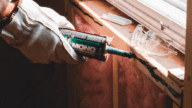What Fixes Are Mandatory After a Home Inspection (If Any)?
- Published on
- 5 min read
-
 Valerie Kalfrin, Contributing AuthorClose
Valerie Kalfrin, Contributing AuthorClose Valerie Kalfrin Contributing Author
Valerie Kalfrin Contributing AuthorValerie Kalfrin is a multiple award-winning journalist, film and fiction fan, and creative storyteller with a knack for detailed, engaging stories.
-
 Sam Dadofalza, Associate EditorClose
Sam Dadofalza, Associate EditorClose Sam Dadofalza Associate Editor
Sam Dadofalza Associate EditorSam Dadofalza is an associate editor at HomeLight, where she crafts insightful stories to guide homebuyers and sellers through the intricacies of real estate transactions. She has previously contributed to digital marketing firms and online business publications, honing her skills in creating engaging and informative content.
Your to-do list when you sell your home is already sizable by the time you arrange for a home inspection. So when an inspector lists a host of issues that might or might not surprise you, do you have to tackle all of those? What fixes are mandatory after a home inspection?
Although 20% of buyers waived inspection contingency, you may still be obligated to resolve certain issues, depending on your state’s and the buyer’s lender’s policies. In this article, we outlined which fixes are mandatory, who pays for them, what happens if you refuse to make repairs, and other common concerns.
What fixes are mandatory for a seller to make?
“Mandatory” fixes can vary depending on where you live, the state of the market, the buyer’s lender, and the language of your purchase agreement. Home inspectors look for anything structurally or mechanically deficient, unsafe, not functioning properly, or not in accordance with a state’s standards. Typically, this covers seven major areas:
- Water damage
- Structural issues
- Old or damaged roofing
- Damaged or old electrical system
- Plumbing problems
- Insect and pest infestation
- Issues with the HVAC system
In addition, some states require inspectors to check for certain items. Nebraska law mandates that a home should have working smoke detectors and carbon monoxide detectors at the time of sale, for instance, says Matt Steinhausen, an independent home inspector since 1999 in Lincoln, Nebraska, who holds an A+ rating from the Better Business Bureau.
Otherwise, what’s mandatory comes down to the purchase agreement and what the buyer’s lender requires, our experts say. For instance, purchasers using FHA, VA, or USDA loans each have particular requirements.
In general, lender-required repairs encompass a home’s major components and anything that might affect living conditions: structural defects (foundation cracks, roof leaks), inoperable or faulty systems (HVAC, electrical, plumbing), and so on, says Neal Team’s Shane Neal, a veteran agent in the San Antonio, Texas.
“There are some cases where there can still be a little bit of negotiation, but ultimately, the seller is asked to fix those so that the buyer can get financing,” he says.
Unresolved major repair issues can mess with a buyer’s loan approval and the appraisal process, causing delays or even killing the deal. Lenders want homes to meet basic safety and structural standards, so things like a leaky roof or faulty wiring can lead to a lower appraisal or loan denial. If the appraisal comes in too low, the buyer might have to renegotiate, ask for repairs, or back out completely.
If nothing is mandatory, what repairs should you make?
Not all home repairs are legally required. However, if an inspection discovers an issue that could affect the buyer’s safety, such as a leaking hot water heater, that should be addressed.
Moreover, making strategic fixes can help you sell faster and for a better price. Buyers may be turned off by major red flags, so addressing key issues, like safety hazards, structural concerns, and cosmetic updates, can boost your home’s appeal and prevent deal-breaking negotiations.
Neal encourages sellers to address such major issues in case the current transaction falls apart.
“If it’s something where the contract doesn’t work out, we’re going headfirst after those [repairs] so […] we’re prepared for the next person,” he says.
What are the common cosmetic repairs buyers request?
While cosmetic repairs aren’t mandatory, buyers often ask for them to improve the home’s appearance and functionality. Sellers don’t have to agree, but addressing minor issues can help the home sell faster. Some common cosmetic repair requests include:
- Touching up paint or repainting: Buyers may ask for fresh paint to cover scuffs, outdated colors, or accent walls.
- Refinishing or replacing flooring: Worn carpets, scratched hardwood, or cracked tiles can be unappealing, so buyers would want these items to be fixed.
- Refinishing cabinets: Dated or chipped cabinets may prompt requests for a refresh.
- Fixing minor wall damage: Small holes from nails, dents, or drywall imperfections can stand out.
- Improving curb appeal: Landscaping, power washing, or replacing an old front door can enhance first impressions.
While not required, handling these requests can make your home more attractive to buyers.
Is it common for a seller to make all of the repairs a buyer requests?
This depends on several factors, including the offer price and the seller’s budget for repairs. The home inspector might note 10 items, but only four or five could be major ones. “The others might be purely cosmetic,” Neal says.
Many agents will use the term “health and safety” as a guideline for which repairs a buyer might request, but again, this comes down to the negotiations and agreement between you and the potential buyer. Steinhausen says he’s noted items that could be considered health and safety issues that weren’t fixed prior to closing, such as:
- Uneven sections of concrete sidewalk
- No handrails on stairs with three steps or more
- Extensive amounts of mold
- Carbon monoxide leaks from appliances, such as water heaters or furnaces
- Faulty locks on exterior doors
- Bedrooms with no egress such as a window, offering an escape route or an entry point for emergency personnel
- No ground-fault circuit-interrupter (GFCI) outlets near sinks in the kitchen or bathroom
- Elevated radon levels
However, a home inspector provides a thorough checklist, so it’s up to the buyer, the seller, and their real estate agents to discuss what fixes to make.
Thomas Day, a top real estate agent in Pompano Beach, Florida, says sometimes a second opinion can negate some repairs. For instance, after one home inspector noted that the electrical panel on a property was outdated, “I had my electrician go out there and look at it, and said there was nothing wrong with it, and that the parts are still readily available and it could last another 10-20 years.”
Andy Peters, a top real estate agent in the Atlanta, Georgia, area, says he doesn’t encourage buyers to ask for repairs that a handyman easily could manage. “When you are arguing over an interior door that doesn’t latch or reverse polarity on an outlet on a $500,000 home, then something is wrong.”
Who pays for the repairs?
That’s open to negotiation, depending on the contract and the scope of the repairs. In most cases, a seller will pay for repairs involving major issues with the structure or components, or at least learn more about what these repairs involve so that they can discuss those with a potential buyer. If there were, say, five of those among an inspector’s recommendations, “we might do two of those or give a credit for the other three,” Neal says.
Some contracts stipulate a dollar amount for the seller to use on repairs discovered through the home inspection, Steinhausen adds. He’s known of this when an inspection finds wood-destroying insects or damage from such pests. The contract might state that the seller is contractually obligated to spend a percentage (say, 1% to 1 1/2%) of the purchase price on treatment, repairs, or both.
How do market conditions influence inspection negotiations?
A strong seller’s market, where there’s high demand for properties but low inventory, gives sellers more flexibility to decide what to fix and what to negotiate with potential sellers. When Neal spoke to HomeLight, San Antonio was experiencing a strong seller’s market, which enabled sellers to be more selective about offers and repairs.
“The seller has such negotiation power given multiple offer scenarios,” he says. “They […] have the ability to pick and choose […] which is a good spot to be for a seller, but not potentially for a buyer.”
What happens if you refuse to make any repairs?
A seller can refuse to make repairs if your agent has listed the property “as is.” When selling a home as is in Florida, asking price takes repairs into account, resulting in a discount.
If a buyer in this situation still asks the seller for repairs, Neal says he’ll kindly remind them “that we had discussed this at the beginning: ‘This is more of an as is. We appreciate the repair request. But unfortunately, we’re unable to do anything when it comes to any of these repairs.’ It really puts the ball back into the buyer’s hands to decide if they want to proceed with the property.”
Weigh the risk of playing hardball
Beyond these dynamics, a seller can always refuse to make repairs, leaving the buyer to decide whether to continue to negotiate — perhaps for a credit or a price adjustment — or walk away.
A seller might not have much choice in the matter. A lender could refuse to approve their loan if required repairs aren’t completed. The lender’s refusal doesn’t automatically mandate that a seller fix anything, Steinhausen adds, but typically, if any required repairs are not completed prior to closing, the deal is off.
Sometimes both parties will modify a contract via an amendment or an addendum to address a maintenance issue that the home inspection uncovered. In Steinhausen’s area, these discussions involve bat or vermin problems, improper grading that affects drainage away from the home, bad siding or trim, faulty windows (with rot or bad thermal pane seals), and wind or hail damage.
Should you sell ‘as is’ to avoid repair requests?
Consider this a tactic only when you feasibly can’t afford any repairs that the inspection recommends. Some sellers suggest selling “as is” when they don’t want to accept offers below a certain price, but they could be doing themselves a disservice, Neal says. An “as is” sale needs the proper pricing “so that people can see past the repairs that could be needed.”
If a seller’s asking price is still realistic and withinthe market value for the home’s size and location, but it needs certain big-ticket repairs, selling “as is” won’t get them the payout they want. “The home does have to be discounted enough to where the buyer feels like they’re not paying a premium price,” he says.
Want to Sell Your Home As Is?
Find out what cash buyer are willing to pay for your home right now.
Home inspection negotiations usually involve compromise
Depending on what your home inspection finds, you might feel like an obstacle — or several — has been dropped into your path to selling your home. But the fixes after a home inspection don’t have to be an “all or nothing” proposition.
Talk to your agent about what repairs really should be done, what you can afford, and how to negotiate with buyers, either through a credit or pricing, to cover that middle ground. “I’ve found that if the seller has the ability to negotiate repairs and work through that … that’s the best win-win scenario,” Neal says.
Header Image Source: (Barn Images / Unsplash)




